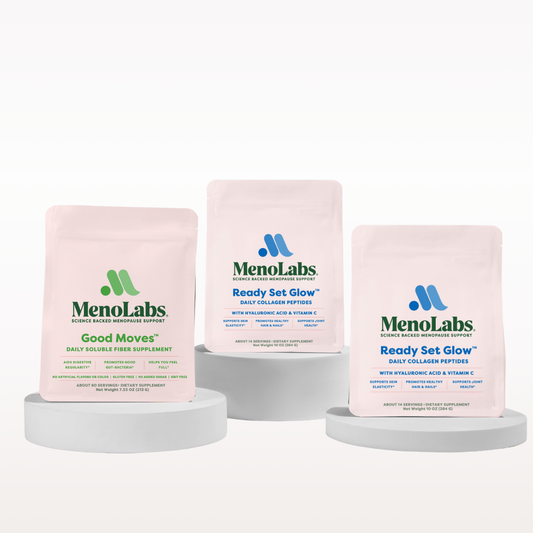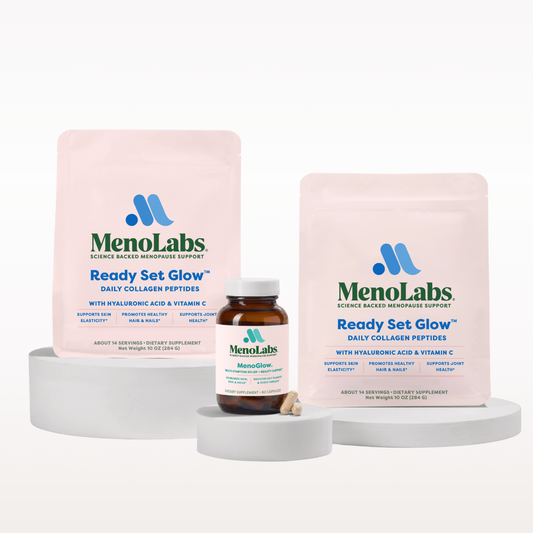Less than one-third of women in midlife feel comfortable talking about their sexual health problems with doctors and their partners. That means two-thirds of women in menopause experience sexual discomfort and refrain from participating in an active, healthy, safe sex life. The biggest contributor to this experience is feeling embarrassed or ashamed. It can be hard to talk to your doctor or your partner about your sexual health problems, but it’s important to understand why talking about it can help your health and your personal life.
Your body goes through a number of changes in menopause and that can have a negative effect on your relationship to your body. Changes in weight, changes to your skin, aging, and a low sex drive can make you feel out of touch with yourself. You may not want to continue your sex life because you don’t feel as comfortable or confident in your body. Or, maybe some things just don’t get you going the same way they did before. It’s okay if you feel this way, but it’s important to not let those feelings hinder your relationship with the people you love, sexual or otherwise.
So, what can you do to help ease some of the discomforts when talking about your sexual needs with your partner, your doctor? Here are five things to keep in mind when talking about your sex life with your partner or your doctor.
Be Honest
No matter how embarrassing a subject may seem, your partner and your doctor are not going to care. What matters most, and should matter most to them, is that you’re healthy. If you’re experiencing tenderness, swelling, or pain during sex, then say so. Doctors can’t read minds and sexual partners can’t either. It’s important to be honest about your symptoms, your discomforts, and your desires. The more they know about what’s going on, the better they can help you to solve those problems.
Be Open-Minded
Let’s suppose you’re not feeling pain or discomfort during sex, but you are feeling less aroused. That’s perfectly normal! The decrease of the sex hormones during menopause can affect your libido, it’s a natural process. Sometimes the routines we fall into in our personal lives can make certain experiences feel less exciting and enjoyable. Be open to shaking up those routines. Be experimental, be adventurous, break out of usual habits, and see what works for you. Sometimes just the experience of something new is enough to stir feelings of desire and arousal. Talk to your partner about what you both feel most comfortable with and go from there.
Explore Your Options
There are a variety of options you can choose from to help you address your sexual health problems. There are medications available to you to help treat some of these problems, like vaginal atrophy. There are commercial products you can use to combat vaginal dryness, like commercial lubricants. There are also sexually explorative methods you can take to better satisfy your needs and your partner’s needs. You and your partner should do some research together to see what your options are and whether or not you feel comfortable pursuing those options. There is a whole world of tools and resources out there. See what they have to offer.
Seek Out Professional Advice
When all else fails, try seeking out some professional help. Sex therapy can be a very valuable tool for couples, especially older couples. They can help you identify more than just sexual needs, but also relationship needs. They can help you and your partner establish a dialogue about the issues you’re experiencing, and sometimes it helps to have someone else in the room to facilitate the conversation. Don’t worry about feeling embarrassed or talking about some very private things with a stranger. They want to help you.
Be Patient
Above all else, remember that there is no immediate magic solution to your sexual health problems. It may take a while before you and your partner are in a place where you both feel you’re seeing results. Medications can take a while to work. Finding new explorative methods can also take a while, as you and your partner will not always be into the same things. It may take a while for the two you to express fully and honestly what it is that you want, you may not even know what you want yet. That’s okay! Just be patient and understand that there are some things you can’t rush and a quick fix isn’t always an option.
You are Not Alone
Of the millions of women that go through these issues every year, your journey is not one you have to go through alone. Find support in your partner, your friends, family, and your doctor. All women will go through this at one point or another in their lives and, yes, it can be embarrassing but it’s not uncommon. Remember that. If you’re experiencing sexual health issues now, and you’re not sure how to take that first step, here’s a list of resources available to you to help you determine the best options.
Related Products
Blend Besties Bundle
Fresh Start Bundle
4.7 / 5.0
(553) 553 total reviews












